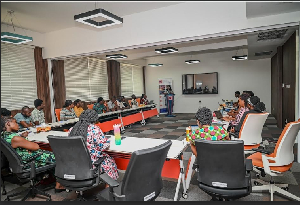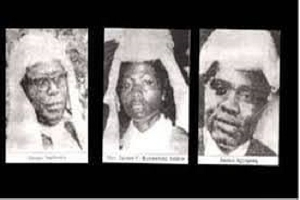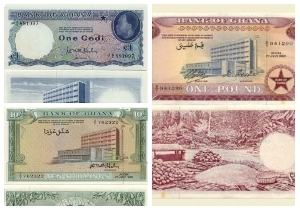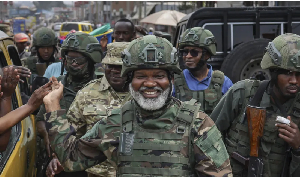Journalists and ACEP dig deep into Ghana's extractive industry secrets
In Ghana, the quest for natural resources often leaves behind scars—both visible and invisible. Communities endure the consequences of environmental degradation, while questions about accountability and sustainable development linger. Who benefits, and who pays the price? In this battle between exploitation and preservation, Ghanaian journalists are stepping up to seek answers.
Amidst these growing challenges, the Media Foundation for West Africa (MFWA) is training a new generation of journalists to dive into the heart of the extractive industry, empowering them to expose injustices and hold powerful stakeholders accountable. Through its Next Generation Investigative Journalism (NGIJ) Fellowship, MFWA is nurturing these journalists with investigative skills tailored to the unique dynamics of Ghana’s extractive sector, aligning with global calls for responsible industry practices as highlighted in the UN Sustainable Development Goals (SDGs). Goals like SDG 12 (Responsible Consumption and Production), SDG 13 (Climate Action), and SDG 16 (Peace, Justice, and Strong Institutions) emphasize the urgency of ethical resource use, environmental stewardship, and transparent governance.
Empowering the next generation of accountability
To broaden their understanding of extractive governance, MFWA’s fifth NGIJ cohort recently visited the Africa Centre for Energy Policy (ACEP), a prominent organization that monitors and influences policies in Ghana’s extractive sector. This field experience was invaluable, connecting theory with the reality of Ghana’s resource economy. As they walked through ACEP’s halls, these journalists learned that uncovering environmental injustices isn’t just about gathering data—it’s about translating that data into stories that people can understand, stories that can drive real change.
The interaction wasn’t one-sided. ACEP’s Policy Lead on Climate Change and Energy, Charles Gyamfi Ofori, underscored the center’s rigorous approach to policy analysis, explaining how they strive to present unbiased, thoroughly vetted information to influence decision-making. “Ensuring accuracy in our analysis is vital,” Mr. Ofori told the fellows, his tone serious yet encouraging. “Our policy analysts invest significant time in assessments to make sure every ‘I’ is dotted and ‘T’ crossed before any report is released. This process builds our credibility, and that’s what gets our recommendations taken seriously by policymakers.”
In an era where facts are often contested and powerful stakeholders may wish to avoid scrutiny, the need for rigorous, unbiased investigation has never been greater. And with environmental issues so deeply intertwined with livelihoods, these emerging journalists have a critical role: Will they be able to uncover the true cost of Ghana’s resource wealth? How will they bridge the gap between policy intent and the reality of communities suffering from environmental harm?
Unearthing the power dynamics of the extractive sector
The fellows quickly learned that uncovering the truth about Ghana’s extractive industry means navigating a complex web of power dynamics. In some cases, government officials acknowledge ACEP’s findings; in others, they don’t. As Mr. Ofori put it, “Sometimes, governments recognize our work; sometimes they don’t. You know they’re listening when they invite us to provide input on key issues. But it’s one thing to be invited, and another for those concerns to truly be addressed.”
With these words, Mr. Ofori highlighted a difficult reality: in a sector where financial stakes are high, influence can be elusive. Inviting input doesn’t always translate to change, especially when vested interests are at play. But for the journalists in MFWA’s fellowship, these challenges were a call to action. As they sat absorbing ACEP’s insights, they were beginning to understand their role not only as storytellers but as agents of accountability who could amplify the voices of communities affected by extraction.
Their mission now extends beyond exposing injustices; it’s about forging a path where Ghana’s natural resources are managed transparently and sustainably.
Reflecting on these insights, Programmes Officer William Nlanjerbor Jalulah emphasized the vital role of collaboration. “This visit is a crucial step toward bridging the gap between policy and awareness,” he said. “For real change to happen, policies must translate into action that the public understands. Working together, we can amplify these issues to push for genuine reform.”
Bridging policy, action, and the path to sustainability
The extractive sector in Ghana is at a critical crossroads, where balancing economic growth and sustainable practices is more than a lofty ideal—it’s an urgent necessity. Ghana’s natural resources have vast potential to support development goals, yet poor governance can undercut this potential, undermining SDG targets and causing irreversible harm to both communities and ecosystems. Through their training, MFWA’s emerging journalists now stand on the frontlines of this accountability gap. Armed with the insights from ACEP and MFWA’s mentorship, they are prepared to shine a light on issues that could otherwise remain hidden, championing SDG 16’s call for inclusive, accountable institutions.
The visit to ACEP was more than an educational experience—it was an immersion into the complexities of policy-making and a revelation of the ways media can drive systemic change. These journalists are now prepared to investigate with purpose, to ask the hard questions: Will companies be held to higher environmental standards? Will communities affected by mining have a stronger voice in decision-making? Can Ghana’s resource-rich lands contribute to sustainable development rather than leaving a legacy of depletion?
MFWA’s new generation of journalists may not have all the answers yet, but their mission is clear. In an industry where transparency is often elusive, they are determined to uncover and amplify stories that matter—stories that challenge, inspire, and hold those in power accountable. Their work may just be the catalyst that bridges policy and public action, bringing Ghana closer to a future where the wealth beneath its soil truly benefits all.
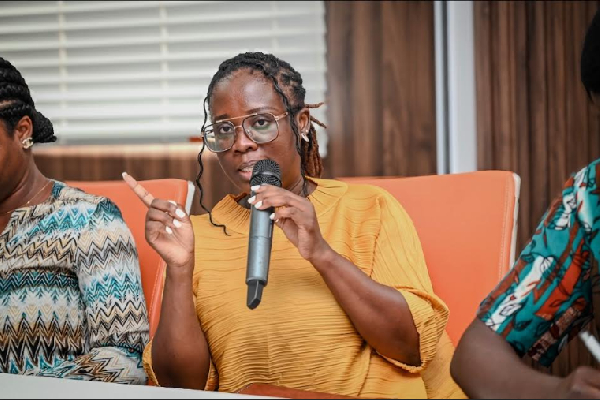
A participant shares her perspective
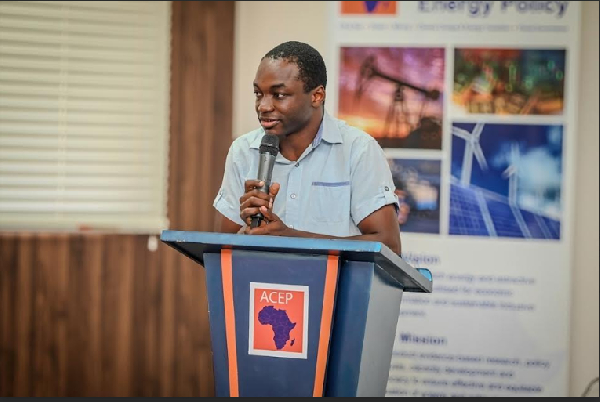
Charlse Gyamfi from ACEP briefs journalist
Opinions of Friday, 8 November 2024
Columnist: Afia Agyapomaa Ofosu





